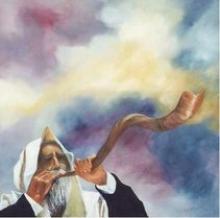Shabbat Shalom and welcome to Judeo Talk. The Torah portion for this week is Parsha Behar-Bechukotai, Leviticus 25:1-27:34.
This is what I like to refer to as a "loaded" parsha. There's a lot of great content here, most of it entirely new. While Leviticus is mostly concerned with laying out laws and reiterating important concepts, this particular reading gets to the core of Jewish philosophy.
The first big thing in this parsha is the law of Jubilee. This is one of the most interesting, curious practices mentioned in the Torah. Put simply, the Jubilee is a divine decree that every fifty years all of society will essentially reboot. Debts will be forgiven, servants will be released from their bonds, property may return to its original owner and grudges must be dropped. It's a sort of super-sabbath, a giant sigh that affords all people, regardless of station, a chance at renewal.
Imagine for a moment what life would be like in the modern world if everyone observed the Jubilee. The cycle of poverty and privilege would essentially grind to a halt twice every century. Granted, the ancient Israelites didn't have a complex credit system and a global economy on their hands, but the principle behind the Jubilee is the important part anyway. It is the philosophy that people should not be doomed to perpetuate their own bad circumstances forever. No child should have to inherit a socio-economic station without the means to transcend it and no person should have so much power over another that they own not only the individual, but the individual's future.
The second big thing in this parsha is the first iteration of what is known as Blessings and Curses. This is a soul-shaking promise from God that those who follow the Torah will prosper, but those who go against it will suffer greatly. These passages are graphic and terrifying. They promise such horrors as being forced to eat the flesh of one's children and being denied the very rain to grow crops. While this section can be read to be a simple iteration of rewards and consequences, I don't really think that's where the value resides.
The problem with the above interpretation is that it posits a causal chain that is inconsistent with the moral core of the Torah. To say that God will punish you for not following the rules is really just too simplistic. In reality, bad things don't happen arbitrarily, they can all be traced to a source. What Blessings and Curses is really saying is that being mindful and doing good will create the circumstances for more good things to happen, while pursuing harm and wickedness will create an atmosphere of strain and mistrust.
We must remember that we are reading a poetic document when we read the Torah. Eating the flesh of one's sons and daughters? Where in the Torah do we have any example of something so horrible happening in the literal sense? It is far more meaningful to read such things as metaphor. Simply, if we commit wrongdoing today, we will suffer from the ill it causes tomorrow. By creating an unsustainable world based on greed and malice, we create a future in which self-destruction is the only option.
Putting these two ideas together, the Jubilee and the Blessings and Curses, we close the book of Leviticus by professing the very reason why we have laws and morals. It is the perfect endcap to Leviticus, the book of law and ritual, because it reminds us why we pursue order. These words are about our very survival, the potential of our future. We need to remember the value of leading just lives and we also need the opportunity to correct our mistakes, lest they build upon one another.
